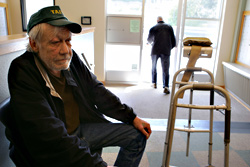Now that the city and homeless shelter provider SHARE/WHEEL have settled their tussle over client data collection, Seattle and King County’s 10-year plan to end homelessness is up and running, and the region is on its way to eliminating the need for tent cities, shelters, and the like. Or is it?
“Everybody would like to see that,” says Leo Rhodes, a SHARE/WHEEL member and de facto spokesperson for the group’s two tent cities. “I wish there were no shelters or tent cities.” But, he says, that time is far off because there are an estimated 8,000 homeless in King County and nowhere to house them all.
“I don’t think we are at the point where we can give up the tent cities we have now,” says City Council member Tom Rasmussen, chair of council’s Housing, Human Services, and Health Committee and a frequent critic of SHARE/WHEEL’s leadership. “I hope we see that on the horizon.”
Both the city and county have promised that, combined, they will drum up 9,500 housing units, complete with “wraparound” social services, by 2015 to end homelessness. The 10-year plan is a shift from the traditional mats-on-the-floor shelter system to a utopia of transitional and permanent housing for the homeless. King County Executive Ron Sims has estimated that the tab will run between $75 million and $100 million a year.
Bill Block, director of the Committee to End Homelessness, estimates that the city and county will see about $60 million in funding this year from local levies, the state’s housing trust fund, and a new fee on real-estate transactions.
“People are committed to generate the resources, and they are actually doing it,” says Block. “It’s not just political statements.”
Asked how soon the need for the two tent cities run by SHARE/WHEEL, frequently at the center of controversy, could close given all this new money, Block says: “It may be a while. There’s a big need for shelter.”
The annual count of the homeless this past January estimated that 1,946 people were without housing of any kind in King County that night. Six hundred and thirty-three people were counted in cars and vans, for example, and 254 were sleeping under roads and freeway off-ramps. The city of Seattle will spend $6.6 million in 2006 to fund approximately 2,000 shelter beds—all of which were filled when the count was conducted.
So how many housing units will come online this year to aid the almost 4,000 people who are either out in the cold or in traditional shelters each night?
The city will add 328 new units of transitional and permanent housing for the homeless this year. The county will add 292 units. It is not clear if the entire $60 million in funding will be spent this year, or if a portion will be held in reserve. The city funded 321 new units of housing in 2005. Among them was the experimental 1811 Eastlake Project, a 75-resident facility for chronically homeless street alcoholics.
Earlier this year, as part of the city’s shift from traditional shelter beds, it announced cuts in allocations to the Downtown Emergency Service Center, the Catholic Archdiocesan Housing Authority, and the Salvation Army. City officials claimed that the cuts were for shelter beds that were no longer needed in the changed world of the 10-year plan. The Archdiocesan Housing Authority of Western Washington said it would have to close the St. Martin de Porres Shelter two days a week. According to Bill Hallerman, director of special ministries, that would send 212 older homeless men packing. The Downtown Emergency Service Center faced the loss of 50 shelter beds.
Now the city is on the verge of backing off the earlier cuts. Later this week, the city’s Human Services Department is expected to restore cuts to the downtown center and the archdiocese (the Salvation Army has reportedly located other funds) to the tune of about $200,000, according to sources with knowledge of the process. Alan Painter, the Human Services deputy director, says the city might not have to go through such a fractious funding process again for the foreseeable future. “We expect to extend all contracts once we get through this process into 2007 and maybe 2008,” he says.
No matter how many housing units become available this year or how many shelter beds are funded, it’s obvious that the dustup with SHARE/WHEEL was an object lesson in just how contentious politics can get between people who all say they are fundamentally committed to ending homelessness.
“This can’t be a complicated bureaucratic plan to end homelessness,” says Rachel Myers of the Seattle/King County Coalition for the Homeless.
The fracas between the city and SHARE/WHEEL resulted from seemingly simple federal requirements forcing the city to collect personal data on homeless people and the group’s insistence that turning over such data would violate the civil rights of the homeless. On April 12, the group and the city reached a brokered agreement after six hours of negotiation and months of public disagreement. Under the agreement, SHARE/WHEEL will turn over required data to the city once a month with the proviso that if individual homeless people refuse to provide data, the city won’t cut funding for SHARE/WHEEL.
Rhodes of SHARE/WHEEL says the group’s willingness to stick with a threat to erect more tent cities in the absence of shelter funding made the difference. “We’re willing to stick together rather than lose our shelters,” he says.







